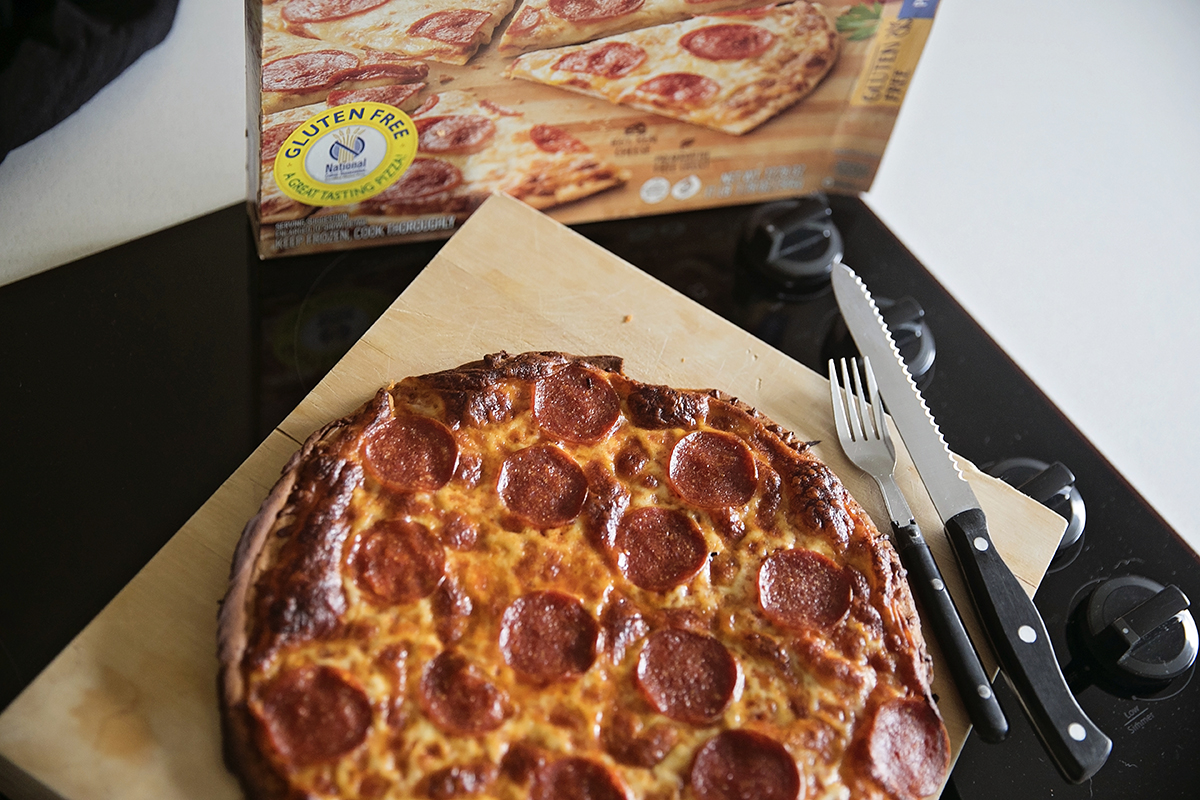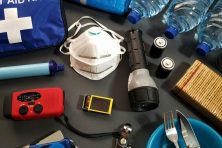My Partner Has Celiac Disease: Here’s What it Costs Us

My partner Nick has been living with celiac disease for over a decade. At its core, the serious autoimmune disorder is an all-out intolerance of the protein gluten. Exposure to gluten can immediately lead to rashes, stomach problems, joint pain, fatigue and more; long-term symptoms could include chronic migraines, diabetes, multiple sclerosis and even cancer.
If you have been diagnosed with celiac disease, transitioning to a gluten-free lifestyle is of immediate importance. Doing so will require some changes to your spending. Here’s how living gluten-free might affect you financially.
You’ll Spend More on Groceries
Many foods that you regularly buy are already gluten-free, like produce, meat and cheese. However, a lot of other foods that might be staples in your pantry do contain gluten — and their gluten-free alternatives are outrageously expensive. Here are some common examples:
Bread
A loaf of bread at my grocery store in Ohio costs between $1 and $2. Gluten-free bread, which is crumbly and tastes like cardboard, is sold in half loaves, which retail for roughly $5 to $7. That means a full loaf of gluten-free bread can cost between $10 and $14, a 500% to 1,400% increase in price.
Pizza

Until I moved in with Nick, I lived an admittedly bachelor lifestyle, which meant frozen pizzas for dinner multiple times a week. While Nick cooks nice dinners for me now — salmon, homemade soup, lasagna, you name it — I still rely on frozen pizzas the nights I need to feed myself.
You can get a regular frozen pizza of decent quality for $5 (though in my college days, I always bought the pizzas that were under $3). The cheapest gluten-free pizza I can find is Kroger’s $6 option, which does the trick, but the some of the best exceed $10 and are often smaller and contain fewer ingredients than comparable pizzas that aren’t gluten-free.
Pasta
A box of gluten-free pasta can cost between $2 and $3, which is more than the $1 I used to spend on regular fettuccine and spaghetti.
Desserts
If you have a sweet tooth and love to bake cookies and cakes, expect to pay a considerably higher price for mixes. Gluten-free cookie dough, for example, costs nearly $6 and makes the same amount of cookies you’d get from a $2 roll of regular dough.
You can also make desserts from scratch, but gluten-free flour is — you guessed it — more expensive than regular flour.
Alcohol
If you are used to buying cheap domestic beer and now find yourself switching to hard cider to satisfy your gluten-free needs, expect to join the world of craft beer prices, even for mass-market ciders. A 12 pack of Angry Orchard costs roughly $18 — about the same price you’d pay for a 24 pack of Bud Lite.
And Keep an Eye Out
Living with celiac disease means always reading the ingredients. Everything from soups to pecans to chips to pudding could contain gluten, even if it is just potential traces of wheat from other products manufactured at the same location. These gluten-free apps make the shopping experience much easier.
You’ll Save on Entertainment Expenses

Dining out at restaurants is becoming easier for people with celiac, but that also depends on your level of sensitivity. Nick, for example, used to be able to eat at restaurants that had gluten-free menu items and dedicated gluten-free spaces in the kitchen, but in the last year, his symptoms have worsened from cross-contamination, and we no longer dine out.
Regardless of the severity of your celiac, you will likely dine out less. Restaurants that cater safely to people with celiac are few and far between. There are just three restaurants in my home state of Ohio that are 100% gluten-free, and only one is within driving distance. That means Nick and I dine at home for every meal. The savings have been tremendous.
But restaurants are not the only entertainment expenses we’ve cut out. Because celiac is an autoimmune disorder that makes Nick a less healthy person in general, we take our physical health very seriously. That means we spend our date nights staying active — hiking, biking, swimming and kayaking for the most part.
If you have been diagnosed with celiac, I would challenge you to make these kinds of activities a regular part of your life. They are great for your health and are free alternatives to activities like bowling, going to the movies or drinking at the bar.
You’ll Have More Medical Expenses
Celiac is a medical condition, which could mean more trips to the doctor. Because of Nick’s weakened immune system, he has been to the emergency room for illnesses that I sometimes wouldn’t even go to the regular doctor for. (He once passed out in an ER waiting room when he was there with strep, which was one of the most frightening moments of my life.)
Thankfully, we have good health insurance that covers many of Nick’s medical expenses. What isn’t covered, however, is Nick’s lost time. If you have celiac disease, you will likely need to call off work more frequently than your coworkers, which could mean lost wages or eventually an employer that passes you up for raises and promotions. Nick, who runs his own small business, takes a hard hit financially when he is bedridden from the chronic migraines that accompany celiac or just from accidental contamination.
If you have just been diagnosed with celiac and have a good relationship with your boss, start a conversation about what it means for your health. Educating your boss on the struggles you are facing could make them more understandable and flexible with your schedule.
You’ll Need to Invest in New Appliances

Nick’s sensitivity to gluten is severe. For example, he can become sick by using a fork that has been washed but has been previously used to eat a food with gluten. While that is on the extreme side, most people with celiac should not use toasters, microwaves or even ovens that have had gluten in them. That, unfortunately, means packing your own meals when visiting friends and family.
When Nick and I moved in together, I had to get rid of all my cookware and appliances, and we purchased new appliances together. We also had to invest in new kitchen staples, like spices and baking essentials, that hadn’t been contaminated. Even when we bought a house last year, we had to get rid of the previous owners’ refrigerator, oven, microwave and dishwasher in favor of gluten-free appliances.
While these are investments anyone would make over time, having to pay for all these things at once can be daunting. But if you have just been diagnosed with celiac, it is the best way to ensure your good health.
You’ll Become an Expert Budgeter
Does Nick love living with celiac? Not at all. At least three times a week, he tells me he’s been dreaming about ordering one of everything from Taco Bell.
But have there been upsides to it? You betcha. Nick and I are more focused on our physical health, both in terms of staying fit and actively considering what we are putting into our bodies. We also have a killer excuse when people ask us to go grab a bite to eat and we’d rather stay home and watch Hulu.
But most importantly, Nick’s celiac diagnosis has forced us to be budget-conscious. We talk about our expenses and savings goals together and understand the importance of sticking to our budget. While I’ve always been a strict budgeter, understanding the heightened grocery bills and the need for emergency medical savings has helped Nick budget along with me.
Celiac doesn’t have to be a death sentence on your finances. Just budget wisely and, above all else, prioritize your health in your spending habits.
Timothy Moore is a market research editor and freelance writer covering topics on personal finance, careers, education, pet care and automotive. He has worked in the field since 2012 and has been featured on sites like The Penny Hoarder, Debt.com, Ladders, Glassdoor and The News Wheel.












